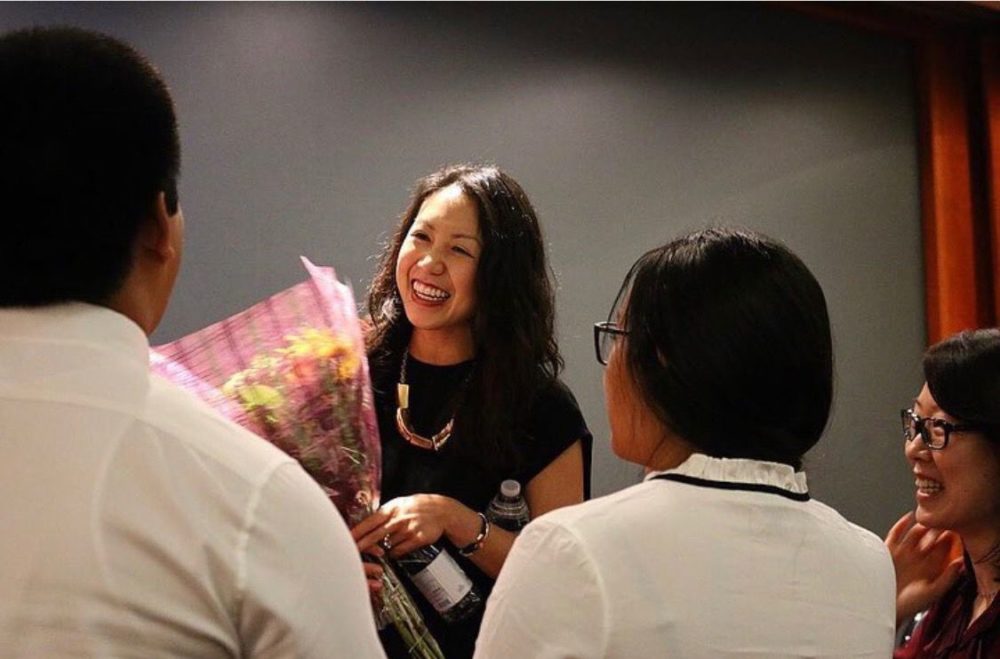
Moviegoers have packed theaters to see Crazy Rich Asians, and LMU students packed Ahmanson Auditorium on October 10 for a conversation with Chantal Nong, the executive at Warner’s DC Film Group who oversaw the production of the blockbuster film.
The film is a 2018 American romantic comedy drama that is the first film by a major studio to feature a majority Asian American cast since The Joy Luck Club in 1993. It’s based on Kevin Kwan’s popular 2013 novel by the same name and tells the story of Rachel Chu, a Chinese American economics professor at NYU, who accompanies her boyfriend, Nick, to his best friend’s wedding in Singapore. During the flight, she learns that Nick’s family is extremely wealthy and he’s considered one of the country’s most eligible bachelors. When they land, Rachel finds herself under attack by jealous socialites and Nick’s disapproving mother.
Yanjie Wang, associate professor of Asian and Asian American Studies, sat down with Nong and discussed the attributes that make the film enjoyable, but also very meaningful to a lot of people. It’s a classic fish out of water story that takes viewers inside the opulence of Singapore’s hyper-wealthy, but Chu’s journey as a young American woman navigating this world adds a layer of freshness to the story. Perhaps most compelling is the all Asian cast playing three dimensional characters instead of the two dimensional stereotypical roles of the perpetual foreigner or smart model minority.
Like the lead character Rachel Chu, the filmmakers also had many obstacles to overcome in bringing Crazy Rich Asians to the big screen. Early on author Kevin Kwan turned down a lucrative deal after it was suggested that a white actress play the leading role. The title Crazy Rich Asians was also heavily criticized for being derogatory. When the film went into testing, its recruit ratio (or the number of people who indicated they’d see the film in theaters) was a dismal 25 to 1.
Despite facing many challenges, the filmmakers and executives remained true to the story. The marketing strategy became about inclusion and making Asian Americans crazy proud while also inviting viewers from all identities to embrace the story and its diversity.
“With this film we strove to tell the authentic story,” said Nong. “While Crazy Rich Asians doesn’t represent all Asians, we hope it opens the door for them to tell their stories.”
The film’s success is already leading to more Asian-led projects and the actors from Crazy Rich Asians are getting incredible new opportunities.
“Since the film’s release I am reading industry news about Asians in creative, production, and acting roles,” said Nong. “This is a true reflection of what’s happening behind the scenes in Hollywood.”
Nong also shared her own climb from waitress/intern to top studio executive and that more needs to be done to support young Asians who want to break into the industry.
“I personally reach out to Asian assistants in my department; take them to lunch, and let them know that my door is always open,” she said.
Nong’s other key takeaway to launch a career in Hollywood was to get started! “Create, intern, and take small but tangible steps forward,” she encouraged.
The Department of Asian and Asian American Studies hosted Nong’s lecture in conjunction with Yanjie Wang’s Contemporary Chinese Cinema and Women in East Asia courses. Prior to Nong’s visit, one student presented on the film, which led to a lively classroom discussion and collaborative effort brainstorming questions for Nong. The students attended the event and made valuable contributions to the conversation with regards to the Chinese market for the film, the potential for an Asian cast of an Asian story to perpetuate racial separation, as well as Nong’s own path as an Asian female in the industry. Following Nong’s lecture, students reflected on the film’s impact on Asian representation in Hollywood, and more specifically, Chinese culture in American cinema.
“Nong’s talk clearly engaged our students by connecting course material to contemporary film and culture, and professional development,” said Yanjie Wang.



